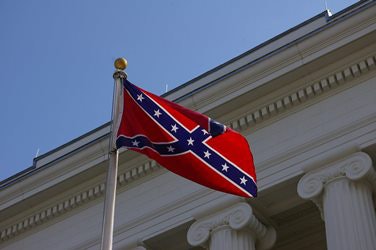
That’s what U.S. history professor Spencer Crew argued recently at a talk titled “The Confederate Flag and the Legacy of Slavery.”
“I think you need to push back,” Crew said when an audience member asked about the view that the Confederate flag represents an important part of history that should not be diminished.
Even though proponents of the Confederate flag claim it is a symbol of Southern pride, history and heritage, Crew said the flag emanates from Southern states’ efforts to maintain African slavery on American soil and therefore represents a “slap in the face” to African-Americans.
His comments come at a time of heightened controversy over the Confederate flag that ensued in the wake of mass murder at a South Carolina church this past June in which a 21-year-old White supremacist — seen holding a Confederate flag in various photographs — allegedly shot and killed nine Black parishioners.
The South Carolina Legislature — acting in response to public outrage over the continued flying of the Confederate flag on the South Carolina Statehouse grounds — ordered the flag removed in the wake of the church killing.
Crew said those series of events represented a shift in perception of the hurt that the Confederate flag continues to cause.
“It seems to me we hit one of those moments in time — and it was a crisis — in which there’s a clear shift in perception and understanding about the repercussions,” Crew said of the Confederate flag being flown in public spaces.
“For African-Americans and others around the country, that was the final straw,” Crew said of the flag being flown over the South Carolina Statehouse. The flag, he said, “did not stand for anything other than oppression and all the values that aren’t core to what we stand for as a nation.”
Crew’s talk at the George Mason University (GMU) campus here focused largely on the history and origin of the Confederate flag in order to better understand its symbolism. The event was hosted by GMU’s School for Conflict Analysis and Resolution, or S-CAR.
Crew traced the history of the flag from the role that it played on battlefields of the Civil War, which he said was a “battle over slavery,” to its reemergence as a symbol of the Dixiecrats in the 1940s during the presidential election of 1948 in their efforts to fight desegregation.
“For them, the flag that represented their point of view, their beliefs, is the ‘Stars and Bars,’ which is adopted by the party and flown at many of their events,” Crew said.
Crew noted that the Confederate flag wasn’t placed on the Statehouse in South Carolina until 1962, purportedly to celebrate the 100th anniversary of the Civil War.
It prompted a boycott from the NAACP, United Auto Workers and NCAA in 2000. The boycott ended after the Legislature removed the flag in the wake of the mass shooting at the Charleston, South Carolina, church.
A renewed debate over allowing the Confederate flag and other tributes to the Confederacy in public spaces has ensued, but Crew said it will likely take future generations to resolve the controversy that surrounds those tributes.
“From the standpoint of diversity, racial lines are much more blurred, and my hope is that in the next couple of generations, it may be a fool’s errand, forgive my pessimism, but I think us, we’re not going to change a great deal,” Crew said. “But the next generation, their world view is so much different, more fluid than ours. My hope is that they will be ready for something like this.”
Jamaal Abdul-Alim can be reached at [email protected] or follow him on Twitter @dcwriter360.





















